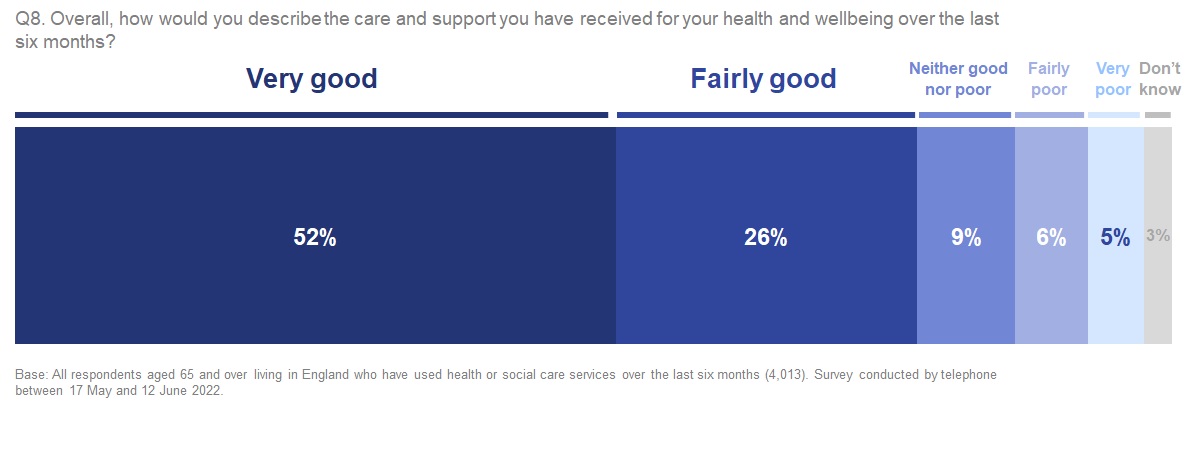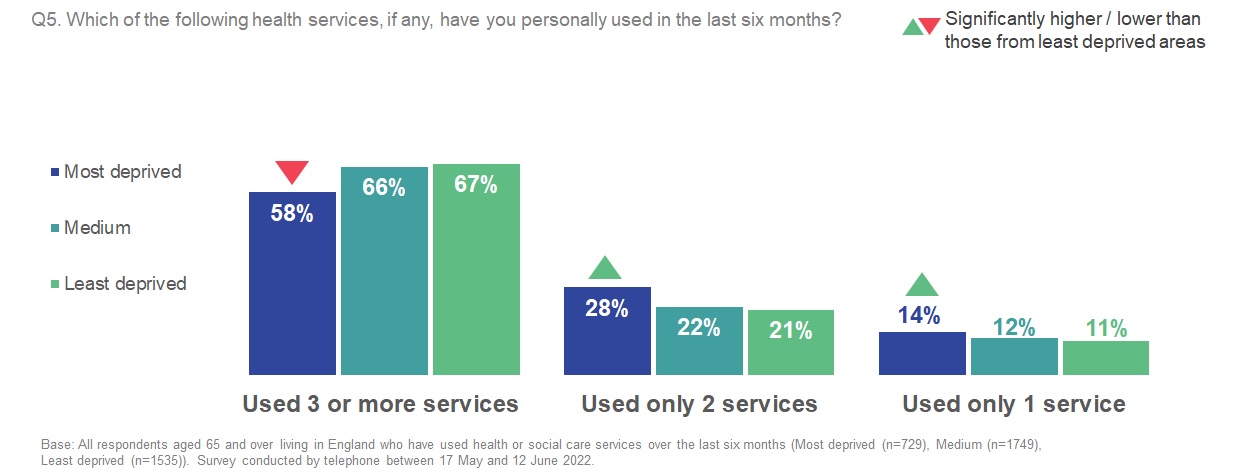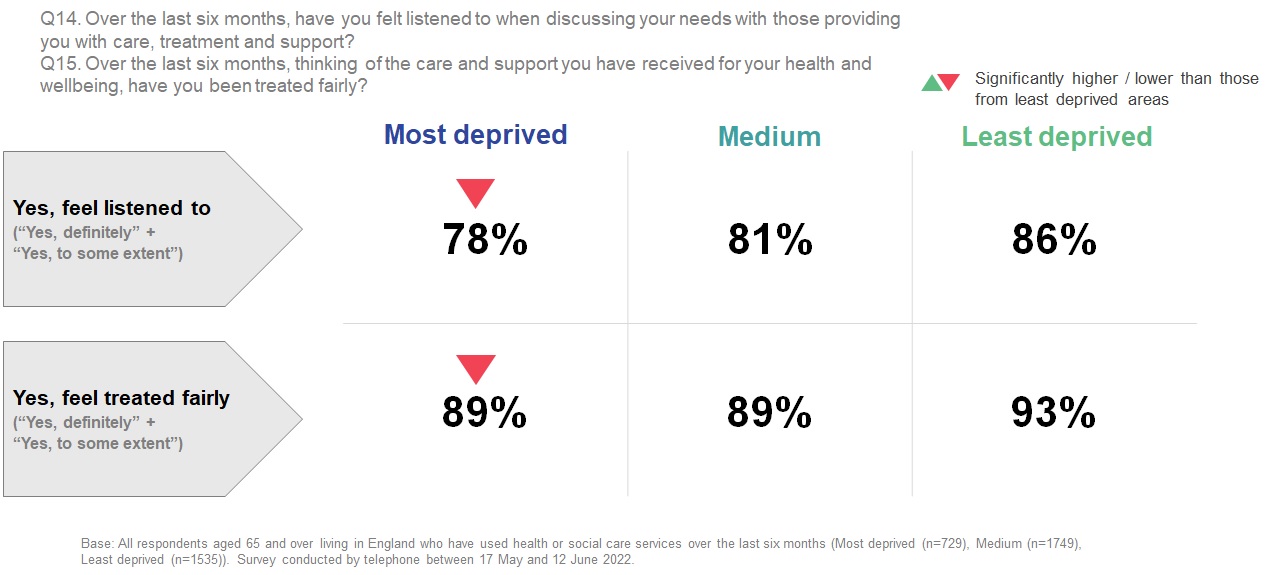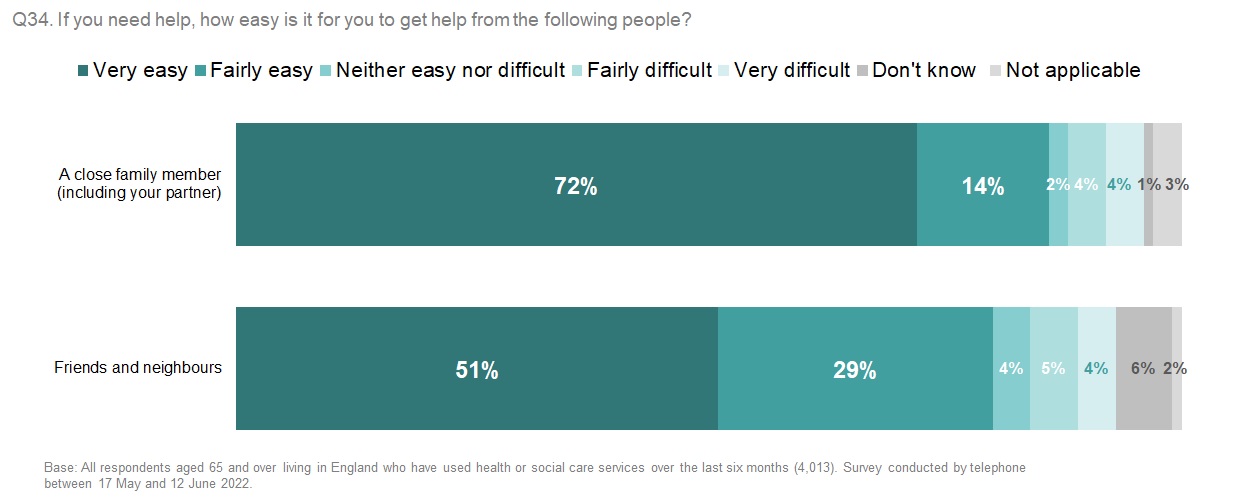Most older people in England are positive about the care and support received for their health and wellbeing in the last six months, but there are risks to health inequalities
Access and quality of health and social care services
Overall, most people aged 65 and over who have used health and social care services in the last six months describe the care and support they have received as good (78%) and feel they have received the care and support they thought they needed, either completely (52%) or to some extent (29%).
 People aged 65 and over who have used health and social care services in the last six months tend to be satisfied with access to these services, both when they need them (65% satisfied) and in a way that suits them (66% satisfied). However, satisfaction with the processes by which people book appointments is lower (54% are satisfied), while poor availability of health professionals and services is the reason most commonly given where people feel they have not received the care and support they need at all, or they have only to some extent.
People aged 65 and over who have used health and social care services in the last six months tend to be satisfied with access to these services, both when they need them (65% satisfied) and in a way that suits them (66% satisfied). However, satisfaction with the processes by which people book appointments is lower (54% are satisfied), while poor availability of health professionals and services is the reason most commonly given where people feel they have not received the care and support they need at all, or they have only to some extent.
The quality of health and social care services provided is largely perceived to be good. For example, over four in five people aged 65 and over who have used health or social care services generally feel like they have been listened to (82%) and treated as a person rather than a condition (84%). A particular strength is being treated fairly in the care and support provided (90% feel so). The information that staff have is also viewed positively overall, with most people (81%) agreeing that staff had the right, up-to-date information about them.
Health inequalities
Although positive at an overall level, the findings highlight that there are risks to health inequalities. For example, in relation to access to health and social care services, people in social grades D and E and people living in deprived areas have used fewer services over the last six months. They use fewer services like dentists, GPs and non-urgent hospital appointments, though they also tend to use services more frequently. Disabled people, those with a long-term health condition or conditions and people living in more deprived areas are less satisfied with being able to access services when they need them and in a way that suits them.

In addition, some groups of people consistently report poorer experiences of care and support than others (for example of being listened to or treated fairly): women, disabled people and those with multiple long-term conditions, people living in more deprived areas, people in social grades D and E, and people with caring responsibilities. Some of these variables have a cumulative effect: disabled people living in deprived areas report poorer experience in terms of quality of care and access to care and support than disabled people living in affluent areas, and the same can be said about carers.

Social networks
Just over half of people aged 65 and over who have used health or social care services in the last six months have accessed some of the groups or activities that contribute to their health and wellbeing that the survey asked about (52%). Others may have accessed similar activities, but do not view this as contributing to their health and wellbeing.
Overall, most people aged 65 and over who have used health or social care services in the last six months find it easy to get help from a close family member (86%) or friends / neighbours (80%) if it is needed, demonstrating strong social networks.

However, those most likely to need help (for example, due to old age, a disability, being on a waiting list) find it comparatively harder to get help from family, friends and neighbours when they need it. Similarly, those with greater care and support needs tend to be less likely to attend groups or activities that contribute to their health and wellbeing.
Experiences of those waiting for health services or a care assessment
Those who are currently waiting, either for health services or for a care assessment, are consistently more negative about health and social care services, in relation to access, the quality of care and the coordination of care. Significant minorities do not currently feel well supported, and/or find that their ability to carry out day-to-day activities is getting worse in comparison with when they were first referred to health services or requested a care assessment. Although some of those waiting feel like nothing could be done to help them manage their condition or keep safe while they wait, for others there is a need for further information to reassure them that they have not been forgotten, and try to give an indication of when they may be seen.
Key findings from this survey are included in CQC’s State of care report, here.
Technical details
Ipsos interviewed 4,250 people aged 65 and over living in England on behalf of CQC. The fieldwork was conducted over the telephone between 17th May and 1st June 2022.
Demographic information was collected for all those willing to take part who met the quotas, but people who had not used health or social care services over the last 6 months prior to the fieldwork were then screened out as they were not eligible for the remaining questions. After screening, a total of 4,013 people completed the whole survey and their average interview length was 20 minutes.
Quotas were set by age (65-74 and 75 plus) and gender (interlocking), as well as Integrated Care Systems (ICS). We also monitored responses by ethnicity and social grade. Data were weighted by the same five variables to ensure that the final results matched the population profile of people aged 65 and over living in England.
To conduct this survey Ipsos used a targeted sample for both landlines and mobiles that was purchased for people aged 65 and over living in England. A limitation of the methodology used is that some groups of people using social care services are likely to be under-represented in the survey, namely people living in care homes and people with substantial or critical social care needs living in the community.



